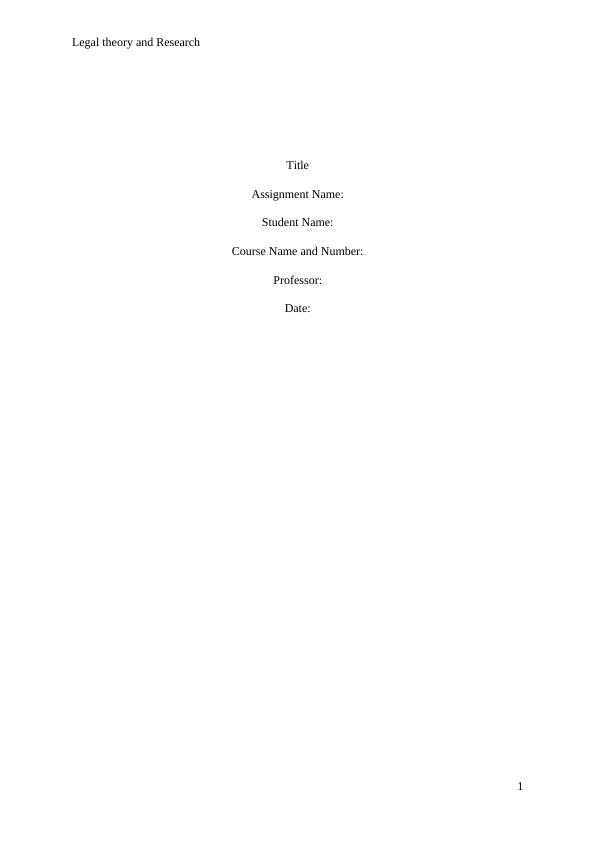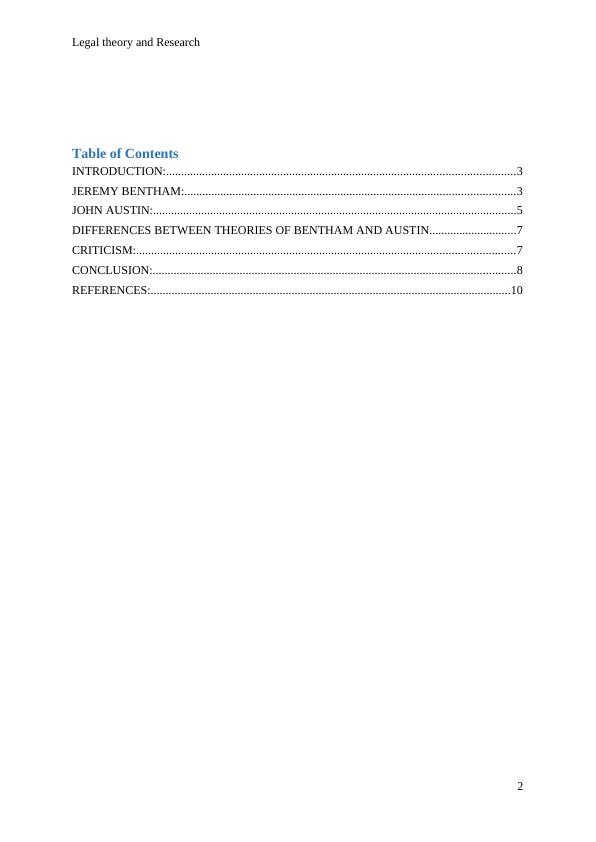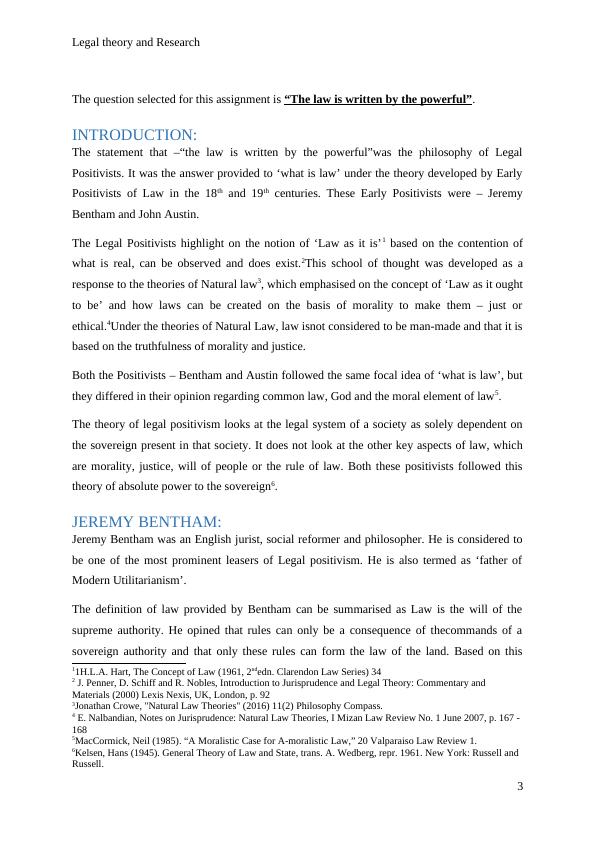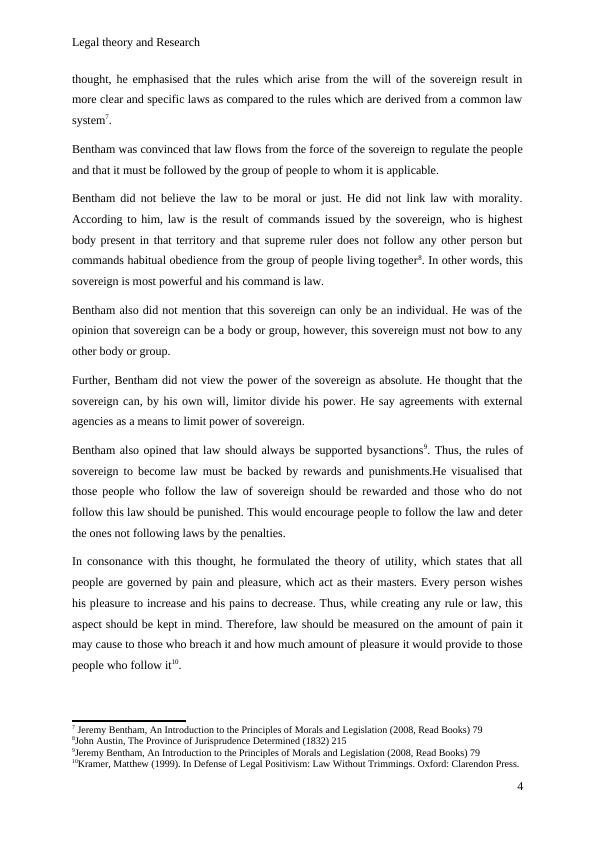Legal Theory and Research: A Comparative Study of Bentham and Austin
Added on 2023-06-05
11 Pages3500 Words450 Views
Legal theory and Research
Title
Assignment Name:
Student Name:
Course Name and Number:
Professor:
Date:
1
Title
Assignment Name:
Student Name:
Course Name and Number:
Professor:
Date:
1

Legal theory and Research
Table of Contents
INTRODUCTION:....................................................................................................................3
JEREMY BENTHAM:..............................................................................................................3
JOHN AUSTIN:.........................................................................................................................5
DIFFERENCES BETWEEN THEORIES OF BENTHAM AND AUSTIN.............................7
CRITICISM:..............................................................................................................................7
CONCLUSION:.........................................................................................................................8
REFERENCES:........................................................................................................................10
2
Table of Contents
INTRODUCTION:....................................................................................................................3
JEREMY BENTHAM:..............................................................................................................3
JOHN AUSTIN:.........................................................................................................................5
DIFFERENCES BETWEEN THEORIES OF BENTHAM AND AUSTIN.............................7
CRITICISM:..............................................................................................................................7
CONCLUSION:.........................................................................................................................8
REFERENCES:........................................................................................................................10
2

Legal theory and Research
The question selected for this assignment is “The law is written by the powerful”.
INTRODUCTION:
The statement that –“the law is written by the powerful”was the philosophy of Legal
Positivists. It was the answer provided to ‘what is law’ under the theory developed by Early
Positivists of Law in the 18th and 19th centuries. These Early Positivists were – Jeremy
Bentham and John Austin.
The Legal Positivists highlight on the notion of ‘Law as it is’1 based on the contention of
what is real, can be observed and does exist.2This school of thought was developed as a
response to the theories of Natural law3, which emphasised on the concept of ‘Law as it ought
to be’ and how laws can be created on the basis of morality to make them – just or
ethical.4Under the theories of Natural Law, law isnot considered to be man-made and that it is
based on the truthfulness of morality and justice.
Both the Positivists – Bentham and Austin followed the same focal idea of ‘what is law’, but
they differed in their opinion regarding common law, God and the moral element of law5.
The theory of legal positivism looks at the legal system of a society as solely dependent on
the sovereign present in that society. It does not look at the other key aspects of law, which
are morality, justice, will of people or the rule of law. Both these positivists followed this
theory of absolute power to the sovereign6.
JEREMY BENTHAM:
Jeremy Bentham was an English jurist, social reformer and philosopher. He is considered to
be one of the most prominent leasers of Legal positivism. He is also termed as ‘father of
Modern Utilitarianism’.
The definition of law provided by Bentham can be summarised as Law is the will of the
supreme authority. He opined that rules can only be a consequence of thecommands of a
sovereign authority and that only these rules can form the law of the land. Based on this
11H.L.A. Hart, The Concept of Law (1961, 2ndedn. Clarendon Law Series) 34
2 J. Penner, D. Schiff and R. Nobles, Introduction to Jurisprudence and Legal Theory: Commentary and
Materials (2000) Lexis Nexis, UK, London, p. 92
3Jonathan Crowe, "Natural Law Theories" (2016) 11(2) Philosophy Compass.
4 E. Nalbandian, Notes on Jurisprudence: Natural Law Theories, I Mizan Law Review No. 1 June 2007, p. 167 -
168
5MacCormick, Neil (1985). “A Moralistic Case for A-moralistic Law,” 20 Valparaiso Law Review 1.
6Kelsen, Hans (1945). General Theory of Law and State, trans. A. Wedberg, repr. 1961. New York: Russell and
Russell.
3
The question selected for this assignment is “The law is written by the powerful”.
INTRODUCTION:
The statement that –“the law is written by the powerful”was the philosophy of Legal
Positivists. It was the answer provided to ‘what is law’ under the theory developed by Early
Positivists of Law in the 18th and 19th centuries. These Early Positivists were – Jeremy
Bentham and John Austin.
The Legal Positivists highlight on the notion of ‘Law as it is’1 based on the contention of
what is real, can be observed and does exist.2This school of thought was developed as a
response to the theories of Natural law3, which emphasised on the concept of ‘Law as it ought
to be’ and how laws can be created on the basis of morality to make them – just or
ethical.4Under the theories of Natural Law, law isnot considered to be man-made and that it is
based on the truthfulness of morality and justice.
Both the Positivists – Bentham and Austin followed the same focal idea of ‘what is law’, but
they differed in their opinion regarding common law, God and the moral element of law5.
The theory of legal positivism looks at the legal system of a society as solely dependent on
the sovereign present in that society. It does not look at the other key aspects of law, which
are morality, justice, will of people or the rule of law. Both these positivists followed this
theory of absolute power to the sovereign6.
JEREMY BENTHAM:
Jeremy Bentham was an English jurist, social reformer and philosopher. He is considered to
be one of the most prominent leasers of Legal positivism. He is also termed as ‘father of
Modern Utilitarianism’.
The definition of law provided by Bentham can be summarised as Law is the will of the
supreme authority. He opined that rules can only be a consequence of thecommands of a
sovereign authority and that only these rules can form the law of the land. Based on this
11H.L.A. Hart, The Concept of Law (1961, 2ndedn. Clarendon Law Series) 34
2 J. Penner, D. Schiff and R. Nobles, Introduction to Jurisprudence and Legal Theory: Commentary and
Materials (2000) Lexis Nexis, UK, London, p. 92
3Jonathan Crowe, "Natural Law Theories" (2016) 11(2) Philosophy Compass.
4 E. Nalbandian, Notes on Jurisprudence: Natural Law Theories, I Mizan Law Review No. 1 June 2007, p. 167 -
168
5MacCormick, Neil (1985). “A Moralistic Case for A-moralistic Law,” 20 Valparaiso Law Review 1.
6Kelsen, Hans (1945). General Theory of Law and State, trans. A. Wedberg, repr. 1961. New York: Russell and
Russell.
3

Legal theory and Research
thought, he emphasised that the rules which arise from the will of the sovereign result in
more clear and specific laws as compared to the rules which are derived from a common law
system7.
Bentham was convinced that law flows from the force of the sovereign to regulate the people
and that it must be followed by the group of people to whom it is applicable.
Bentham did not believe the law to be moral or just. He did not link law with morality.
According to him, law is the result of commands issued by the sovereign, who is highest
body present in that territory and that supreme ruler does not follow any other person but
commands habitual obedience from the group of people living together8. In other words, this
sovereign is most powerful and his command is law.
Bentham also did not mention that this sovereign can only be an individual. He was of the
opinion that sovereign can be a body or group, however, this sovereign must not bow to any
other body or group.
Further, Bentham did not view the power of the sovereign as absolute. He thought that the
sovereign can, by his own will, limitor divide his power. He say agreements with external
agencies as a means to limit power of sovereign.
Bentham also opined that law should always be supported bysanctions9. Thus, the rules of
sovereign to become law must be backed by rewards and punishments.He visualised that
those people who follow the law of sovereign should be rewarded and those who do not
follow this law should be punished. This would encourage people to follow the law and deter
the ones not following laws by the penalties.
In consonance with this thought, he formulated the theory of utility, which states that all
people are governed by pain and pleasure, which act as their masters. Every person wishes
his pleasure to increase and his pains to decrease. Thus, while creating any rule or law, this
aspect should be kept in mind. Therefore, law should be measured on the amount of pain it
may cause to those who breach it and how much amount of pleasure it would provide to those
people who follow it10.
7 Jeremy Bentham, An Introduction to the Principles of Morals and Legislation (2008, Read Books) 79
8John Austin, The Province of Jurisprudence Determined (1832) 215
9Jeremy Bentham, An Introduction to the Principles of Morals and Legislation (2008, Read Books) 79
10Kramer, Matthew (1999). In Defense of Legal Positivism: Law Without Trimmings. Oxford: Clarendon Press.
4
thought, he emphasised that the rules which arise from the will of the sovereign result in
more clear and specific laws as compared to the rules which are derived from a common law
system7.
Bentham was convinced that law flows from the force of the sovereign to regulate the people
and that it must be followed by the group of people to whom it is applicable.
Bentham did not believe the law to be moral or just. He did not link law with morality.
According to him, law is the result of commands issued by the sovereign, who is highest
body present in that territory and that supreme ruler does not follow any other person but
commands habitual obedience from the group of people living together8. In other words, this
sovereign is most powerful and his command is law.
Bentham also did not mention that this sovereign can only be an individual. He was of the
opinion that sovereign can be a body or group, however, this sovereign must not bow to any
other body or group.
Further, Bentham did not view the power of the sovereign as absolute. He thought that the
sovereign can, by his own will, limitor divide his power. He say agreements with external
agencies as a means to limit power of sovereign.
Bentham also opined that law should always be supported bysanctions9. Thus, the rules of
sovereign to become law must be backed by rewards and punishments.He visualised that
those people who follow the law of sovereign should be rewarded and those who do not
follow this law should be punished. This would encourage people to follow the law and deter
the ones not following laws by the penalties.
In consonance with this thought, he formulated the theory of utility, which states that all
people are governed by pain and pleasure, which act as their masters. Every person wishes
his pleasure to increase and his pains to decrease. Thus, while creating any rule or law, this
aspect should be kept in mind. Therefore, law should be measured on the amount of pain it
may cause to those who breach it and how much amount of pleasure it would provide to those
people who follow it10.
7 Jeremy Bentham, An Introduction to the Principles of Morals and Legislation (2008, Read Books) 79
8John Austin, The Province of Jurisprudence Determined (1832) 215
9Jeremy Bentham, An Introduction to the Principles of Morals and Legislation (2008, Read Books) 79
10Kramer, Matthew (1999). In Defense of Legal Positivism: Law Without Trimmings. Oxford: Clarendon Press.
4

End of preview
Want to access all the pages? Upload your documents or become a member.
Related Documents
SOCIOLOGY. 1. Legal Philosophy Student’s name Universitlg...
|3
|419
|92
Criminal Responsibility in Medical Lawslg...
|10
|3926
|62
The Hart and Fuller Debate on Legal Positivismlg...
|21
|5346
|81
Why Should People Obey Lawlg...
|9
|3283
|489
(Solution) Assignment on Criminal Lawlg...
|8
|1763
|217
